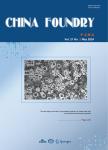Modeling studies on divorced eutectic formation of high pressure die cast magnesium alloy
Modeling studies on divorced eutectic formation of high pressure die cast magnesium alloy作者机构:Hubei Key Laboratory of Advanced Technology for Automotive Components Wuhan University of Technology Wuhan 430070 China Hubei Collaborative Innovation Center for Automotive Components Technology Wuhan 430070 China School of Materials Science and Engineering Tsinghua University Beijing 100084 China
出 版 物:《China Foundry》 (中国铸造(英文版))
年 卷 期:2018年第15卷第1期
页 面:58-65页
核心收录:
学科分类:08[工学] 080203[工学-机械设计及理论] 080502[工学-材料学] 0805[工学-材料科学与工程(可授工学、理学学位)] 0802[工学-机械工程]
基 金:financially supported by the Fundamental Research Funds for the Central Universities(WUT:2017IVA036) 111 Project(B17034) State Key Laboratory of Materials Processing and Die&Mould Technology,Huazhong University of Science and Technology(P2018-003)
主 题:magnesium alloy high pressure die casting divorced eutectic microstructure simulation
摘 要:The morphology and content of the divorced eutectic in the microstructure of high pressure die casting(HPDC) magnesium alloy have a great influence on the final performance of castings. Based on the previous work concerning simulation of the nucleation and dendritic growth of primary α-Mg during the solidification of magnesium alloy under HPDC process, an extension was made to the formerly established CA(Cellular Automaton) model with the purpose of modeling the nucleation and growth of Mg-Al eutectic. With a temperature field and solute field obtained during simulation of the primary α-Mg dendrites as the initial condition of the modified CA model, modeling of the Mg-Al eutectic with a divorced morphology was achieved. Moreover, the simulated results were in accordance with the experimental ones regarding the distribution and content of the divorced eutectic. Taking a cover-plate die casting with AM60 magnesium alloy as an example, the rapid solidification with a high cooling rate at the surface layer of the casting led to a fine and uniform grain size of primary α-Mg, while the divorced eutectic at the grain boundary revealed a more dispersed and granular morphology. Islands of divorced eutectic were observed at the central region of the casting, due to the existence of ESCs(Externally Solidified Crystals) which contributed to a coarse and non-uniform grain size of primary α-Mg. The volume percentage of the eutectic β-Mg_(17)Al_(12) phase is about 2%-6% in the die casting as a whole. The numerical model established in this study is of great significance to the study of the divorced eutectic in the microstructure of die cast magnesium alloy.



